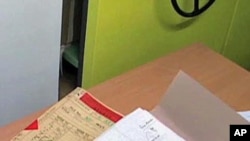Archive files released by Britain shed new light on that country's relationship with Iran in 1979, when the Shah fled the country and Ayatollah Khomeini returned to be the supreme leader of the new Islamic Republic.
In 1979, Iran was on the brink of a revolution.
The Shah, Mohammed Reza Pahlavi, fled in January. The following month, Ayatollah Ruhollah Khomeini returned from exile to become the country's supreme leader in the new Islamic Republic.
The crisis reached a new pitch when Iranian students took 66 Americans hostage when the Shah traveled to the United States for cancer treatment.
Thirty years later at the National Archives in Britain, documents that were once secret are being made public, as mandated by British law. They're filling in details of what Britain thought of Iran at the time.
"A huge amount of documents are released, and it's an absolute treasure trove for historians," said Mark Dunton, a records specialist.
Historians have been looking through the documents, like Majid Tafreshi, an Iranian expert. He says the release of the documents is crucial.
"It's important for both historians and journalists to look at these documents and talk and write about Iranian recent history and the last three decades and the establishment of Islamist government in Iran," Tafreshi said.
He says he's learned that the hostage taking initially had nothing to do with the Iran's government and the Ayatollah Khomeini. He says it was politicized only later.
"As we can see from these documents, hostage taking had nothing to do with the Iranian government and Ayatollah Khomeini at the beginning, but soon Ayatollah himself and whole government, new government ... tried to take advantage of the event and this student initiation became a state-run policy," Tafreshi said.
He says another important revelation is the divisions in Iran at the time.
"You can see the factionalism in these documents beginning from the very first day of the Iranian revolution. Nationalists and intellectuals and ayatollahs and zealous factions ... they began their rivalry right before collapse of Shah's regime," Tafreshi said.
He says those divisions are still clear today, and the historic documents help us understand them.
"With these documents you can find a better picture of what is going on Iran now, and without them I think the picture is not that clear," Tafreshi said.
In 1979, revolutionary Iran was a mystery to Britain. Thirty years later, the current Iranian government is in turmoil, in part blaming Britain for its troubles, and to much of the world, still opaque.
News
Britain Opens 30-Year-Old Files on Iran
update

Documents offer insights into U.S. hostage taking, factionalism among revolutionaries.





